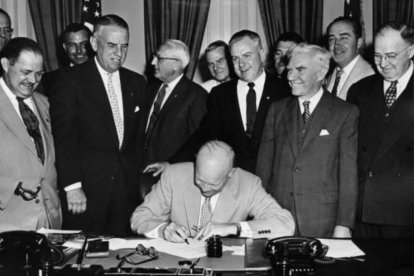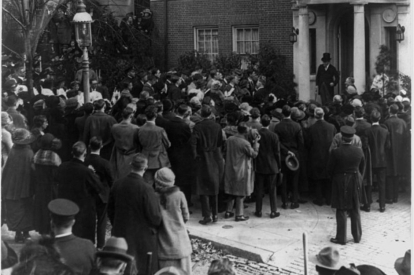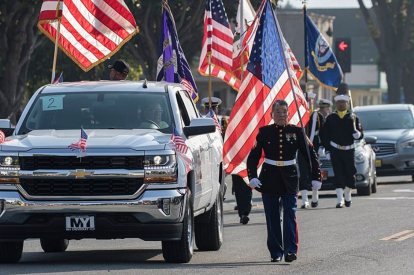The story behind Veterans Day: from informal beginning in Alabama to Eisenhower's signing
According to the 34th president, it is a date to honor "the sacrifices of all those who fought so bravely, on the seas, in the air and on foreign shores, to preserve our heritage of freedom."

Wikimedia Commons
Veterans Day is one of the 11 national holidays of the United States and is celebrated annually every November 11. Its history is relatively recent and began as a local informal tradition that ended with the signature of President Dwight Eisenhower, who in 1954 expressed that they would commemorate "the sacrifices of all those who fought so bravely, on the seas, in the air and on foreign shores, to preserve our heritage of freedom [...] so that your efforts have not been in vain."
Unlike Memorial Day, which honors those who gave their lives to ensure the American way of life, Veterans Day "is reserved to thank and honor living veterans who honorably served in the military during times of war or peace."
A day "dedicated to the cause of world peace"
The history behind this date is quite recent, as it began in 1918, precisely on the 11th day of the 11th month at 11:00 a.m. when the Allies and Germany reached the armistice that seven months later resulted in the Treaty of Versailles and marked the end of the World War I. As a celebration, President Woodrow Wilson celebrated Armistice Day for the first time in 1919, which would be the first antecedent of Veterans Day as it is known in 2023.

Veterans Day
A few years later, in 1926, Congress insisted on bringing more formality to the matter and asked then-President Calvin Coolidge to promote "appropriate" ceremonies for that date. However, it was not until May 1938 that a Bill (52 Stat. 351; 5 US Code, Sec. 87) made November 11 a legal holiday.
It would be a day "dedicated to the cause of world peace and to be celebrated in the future," baptized as Armistice Day, originally intended to honor veterans of the First World War.
From Armistice Day to Veterans Day
Of course back then no one knew that an even more violent war was just around the corner. World War II required the greatest mobilization of soldiers, sailors, marines, and airmen in the nation's history.
The first to notice this was a veteran named Raymond Weeks, who had the idea of expanding the concept of "Armistice" to include all veterans and not just those from World War I.
With this in mind, the 83rd Congress amended the 1938 legislation, removing the word "Armistice" and replacing it with "Veterans." Veteran Congressman Ed Rees (R-KS) was the author of this text, which would later reach the president's desk. Dwight Eisenhower was the pen holder who signed this change in 1954 and then signed a proclamation dated October 8 of that same year.

Veterans Day
"Therefore, I, Dwight D. Eisenhower, President of the United States of America, call upon all of our citizens to observe Thursday, November 11, 1954, as Veterans Day. On that day, let us solemnly remember the sacrifices of all those who fought so bravely, on the seas, in the air and on foreign shores, to preserve our heritage of freedom, and let us rededicate ourselves to the task of promoting lasting peace so that your efforts may not have been in vain. I also order the relevant Government officials to arrange for the display of the United States flag in all public buildings on Veterans Day," he said at the time.
Weeks himself led a delegation in 1947 that proposed the change to then-General Eisenhower. His effort for the cause was such that he is remembered as the "father of Veterans Day." In November 1982, President Ronald Reagan awarded him the 1982 Presidential Citizen Medal, defining Weeks as a man who "dedicated his life to serving others, his community, the American veteran, and his nation."
"So let us leave here, having learned the lessons of history, confident in the strength of our system and eager to pursue all avenues to peace. And on this Veterans Day, we will remember and be firm in our commitment to peace, and those who died in defense of our freedom will not have died in vain," the Republican added in his speech.
Brief change and restoration of President Ford
Everything continued its course until June 1968, when a new law that went into effect sought to ensure three-day weekends for federal employees, adding Monday and thus changing the date of Veterans Day to October 25. The change was implemented in 1971, due to the discontent of a large part of the population.
However, President Gerald Ford signed new (and final) legislation to return Veterans Day to its original date of November 11.
"Since that law went into effect, it has become clear that the commemoration of this day on November 11 is a matter of historical and patriotic importance for a large number of our citizens," the Republican declared in a statement.












